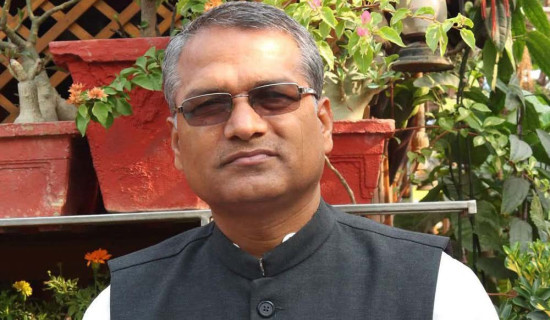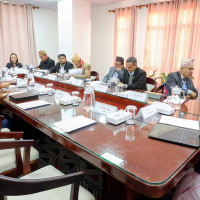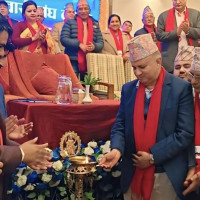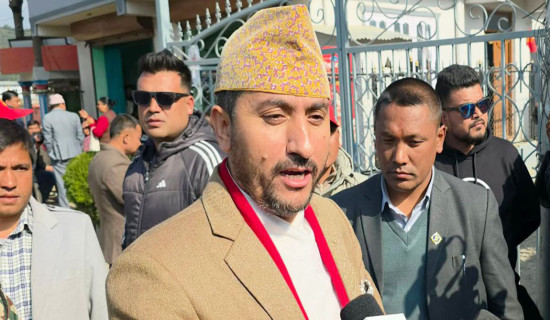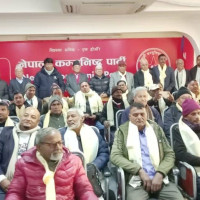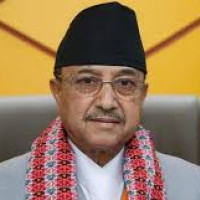- Saturday, 27 December 2025
Meditation Helps Heal Social Wounds
Mediation is generally eastern spiritual practice aimed at attaining mental and physical wellbeing. Spiritual route of meditation is deemed strongly connected to the purpose of healing, increasing vitality and improving the condition of individuals to minimise the intensity of personal peril, suffering and trauma. It enables us to deal with the negative effects of tension, enabling new responsibility to create healthier conditions for better memory, tranquility and peace. Meditation captures the ancient spirit of longevity of life and a change in personal life. It emerges from the positive nature of human will to improve the state of general health by means of emotional regulation.
Healthy mind and good character provide an enduring impulse for peace with self and society. It disciplines human beings through the control of many symptoms of ego, anger, stress and grievances while uplifting them to higher order of life by generating intense feeling, morality, compassion and freedom. Mediation in solitude renews human abilities to tame the flow of energies around and create perfect peace in life. Erosion of spiritualism and decline in the quality of personal life in Nepal has added an intense anxiety disorder. To overcome this condition, spiritual gurus, healers and therapists have laid stress on the worth of meditation. Nepal’s history of meditation reveals that it has played a central role in breath-control and also reflection about the duty of human beings to others, species and larger cosmos for a harmonious, just and peaceful order of life.
Mental peace
The practice of yogas by yogis (sages) and spiritual persons is aimed to control the body and mind for the attainment of physical rest and mental peace. It requires the concentration of mind, awareness, deepening inner insight and transcendence. It also seeks a balance of the well-being of the emotional state by focusing on blissfulness so as to enhance attention, stress reduction and calmness, eradicate negative feelings and improve the immune system of the body. Now meditation is popular among the ordinary Nepalis even in rural areas. It inculcates a feeling in them that human fitness requires physical, mental and emotional wellbeing.
The world is suffering from various types of stresses — ecological, social, economic, psychological, religious, political turmoil, civil war and identarian conflicts with worrying effects. Raging domestic violence, human trafficking, illegal migration, gender discrimination and social evils have troubling effects. The peaceful response to this situation is possible through serene thoughts, methods and actions. Meditation strengthens our ability to distinguish right from wrong, tuning us with nature’s rhythm. Time and nature itself carry potential to the healing effect of the festering sores. Release of positive energy demands compassion, creativity and mental order that place individuals in connection with the cosmos.
Recognising the significance of meditation, the UN General Assembly proclaimed December 21 as the World Meditation Day, considering it the right of every one to the enjoyment of the highest attainable standard of physical and mental health. These days, schools, colleges, community assemblies, private clubs and religious organisations are engaged in various aspects of meditation. Professional trainers are available to coach the learners. A number of them have introduced yoga classes, a form of meditation to educate the younger generation of citizens about the values of it and even conducting research.
Mediation’s education is essentially moral aiming to restore the peaceful order of society. Its lofty contents help to foster peaceful virtue which is important to cultivate proper moral patterns for improved social relationships and resolve the traumatic condition of society. The power of meditation unveils the interconnectedness of life and problems in new ways and finding amenable solutions. Stress management through it helps in mitigating heart problems, sleeplessness, depression, heart disease, negative feelings and social withdrawal. Bhagavad Gita stresses on meditation for integrity, focus and inner peace.
Awakening of our inner self and knowledge is indispensable for peaceful coexistence with others. Gautam Buddha, an apostle of world peace, has achieved Nirvana via meditation and self-reflection. His idea of a mindful or blissful society has been extended to the Western world so far comfortable with materialism of science and modernity. Many Western people are now in a quest for spiritual and moral life through meditation to prevent mental problems and foster cooperativeness and duty to serve others. To overcome the life of isolation and loneliness, they perform meditation to cope with psychotic experience, disorder, depression and mental health-specific personal vulnerability.
Ancient roots
Different types of meditation such as mantra and sound-guided, focused, transcendental chakra, Vipassana, etc. are practiced in Nepal. Based on its nature, one can practice it by sitting in a quiet place or chair, garden, near river sites, under trees or any part of nature where tranquility prevails and noise does not disturb the concentration of mind. The span of time ranges from just five minutes to hours and hours and even months depending on necessity. It increases inner attention by which people come to know themselves and their hidden potential. Unleashing positive energy requires regular practice of meditation. Nepal has its ancient roots. Modern education based on material achievement, career prospect and comfort of technology has undermined its utility. But slowly its importance is gaining salience and resonance in everyday life of Nepalis.
The resilience of Nepali communities can be attributed to spiritual feelings of giving, charity and deep empathy to heal social wounds. Meditation is not simply about being in mental peace but also rebuilding lives and society shattered by violent conflicts the nation has undergone. It is home grown practice aimed to awaken the balance of mind, body and soul. Investment in meditation promotes sustainable peace based on inner connections of people among themselves and with nature. In post conflict and post-quake rebuilding Nepal, the majority of people practice meditation to shore up the balance of mental and physical life for peace.
(The author holds an MA in Peace and Conflict from Otto-Von Guericke University, Germany.)



